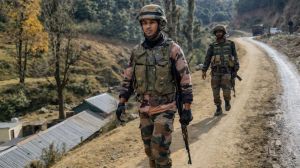Desperately Islamic
Pakistan's political leadership has done it again. Once more religion has been pressed into service to serve the political interests of t...

Pakistan8217;s political leadership has done it again. Once more religion has been pressed into service to serve the political interests of the ruling establishment, legitimise a weak-kneed government that has failed to deliver, and heighten tensions in the region. Once more the Muslim divines, waiting in the wings, would endeavour to Islamicise state and society.
In the process, the people of Pakistan, having repudiated the fundamentalist legacy of Zia-ul-Haq and voted in a secular coalition, remain at the receiving end. The electorate is once more left high and dry in Pakistan8217;s fractured democratic experience.
The scholar Fazlur Rahman pointed out in the early 1980s that the slogan,quot;in Islam religion and politics are inseparable, is employed to dupe the common man into accepting that, instead of politics or the state serving the long-range objectives of Islam, Islam should come to serve the immediate and myopic objectives of party politicsquot;.
This is an apt comment on the state of contemporary politics inneighbouring Pakistan. The liberal and secular elites, outraged by Nawaz Sharif8217;s enthusiasm for Islamisation Fifteenth Amend-ment Bill introduced in the National Assembly on August 28, have promptly aired their disquiet and dissent.
But, are they strong enough to win the day? True, their influence in Pakistan society has grown in recent years, but it is no easy task to deal with the well-entrenched religious establishment. The strength of their detractors in the secular8217; as well as the traditional8217; groups is compounded by the unresolved tension, one that plagues a number of Muslim societies, between the Islamic notions of community and state and the compulsions of running a modern nation-state.
Admittedly, the neo-fundamentalist parties have fared poorly in electoral politics, but their popular appeal has not diminished. So that the ultimate success of the secularists-modernists combine would depend on their ability to mobilise their strength to isolate the protagonists of political Islam8217; in theJamaat-i-Islami and such other organisations.
M.A. Jinnah, in a broadcast in February 1948, stated: quot;Islam and its idealism have taught us democracy. It has taught equality of man, justice and fairplay to everybody8230;.In any case Pakistan is not going to be a theocratic state 8212; to be ruled by priests with a divine missionquot;.
Equally, some leaders and intellectuals talked of quot;the nightmare of Pakistan8217;s going back to a rigid, backward, narrow countryquot;. quot;For us, the intellectuals, the problem is that Pakistan shall not go back. That it should not become simply an extension of Afghanistan. It is a nightmare for us. The danger of the mullahs coming to power is serious; it would be calamitous. This is the terrorquot;.
Yet the secular project was not part of the political discourse during the early decades of Pakistan8217;s existence. Hence the liberal and secular voices remained feeble and fragmented. The political elites, drawing sustenance from the two-nation theory, continued to make concessions toneo-fundamentalist groups.
Thus the ulama wanted the state to be declared Islamic, which the first constitution, adopted in 1956, declared it to be. Later, they attacked the progressive Muslim Family Laws Ordinance, promulgated by Ayub Khan on March 2, 1961. In the first amendment Act of 1964, the name of the country was again changed from the Republic of Pakistan to the Islamic Republic of Pakistan.
The Pakistan People8217;s Party, led by Zulfiqar Ali Bhutto, fared no better. As a practitioner of realpolitik and moving according to the conception of what was most advantageous in the gaining and maintaining of power, Bhutto cultivated the conservative and religious parties. The most significant concession was granted in 1974 when the Qadianis were declared a non-Muslim sect.
The PPP banned alcohol, gambling and night clubs, as well as replacing Sunday with Friday as the weekly holiday. The liberal Muslims, unable to question these measures which are backed by the authority of the Sharia, had toswallow the bitter pill.
Zia-ul-Haq8217;s Islamisation programme covered judicial reforms, the introduction of an Islamic penal code, the creation of a federal Shariat court, and new educational policy incorporating Islamic tenets8217;. These measures legitimised the power of the ulama, institutionalised theocracy against the wishes of most people, and, in the process, increased the divisions, ruptures and bitterness within an already insecure nation.
quot;Military dictatorships, even without divine missions, are bad enough. When they are imbued with the spirit of religious fundamentalism, an atmosphere of ideological oppression suffocates the creative impulses of a societyquot;, wrote Omar Noman in Pakistan: Political amp; Economic History Since 1947. Though Nawaz Sharif has been committed to the Islamisation Bill since he assumed office in February 1997, there were no immediate political compulsions, regardless of America8217;s cruise missile attack on Afghanistan, to take recourse to an ill-advised move. IfPakistan8217;s economy is in tatters, how is the Islamisation Bill going to help?
As a democratically-elected leader, Nawaz Sharif should have learnt his lesson from his country8217;s bitter experiences in the past. He should know that the essence of a democratic order lies in letting people follow their moral and religious codes, and that under no circumstances should state authority be extended into the private domain or used to prescribe, in the light of a religious text, what is right and to forbid what is wrong.
Pakistan was no doubt created by the Muslims for the Muslims. But more than 50 years later the state can no longer afford to either nurture or acquire the role of a vanguard for a fundamentalist vision of Islam. A modern state, after all, cannot be structured, as some of the West Asian countries have belatedly discovered, on the indivisibility of the din wadawla, quot;religion and statequot;.
The debate will go on ceaselessly. Meanwhile, please consider the observation of the scholar Nazib Ayubithat some of the heat in the fundamentalist cause will be taken away once the Islamists are permitted to air their views in the open, and once they are allowed to compete, succeed and fail. The last point is particularly important, for the more Irans and Sudans you get, the less impressive and appealing the Islamists8217; call will become. I do not share this optimism, but let me leave you to reflect on this interesting proposition.
- 01
- 02
- 03
- 04
- 05































